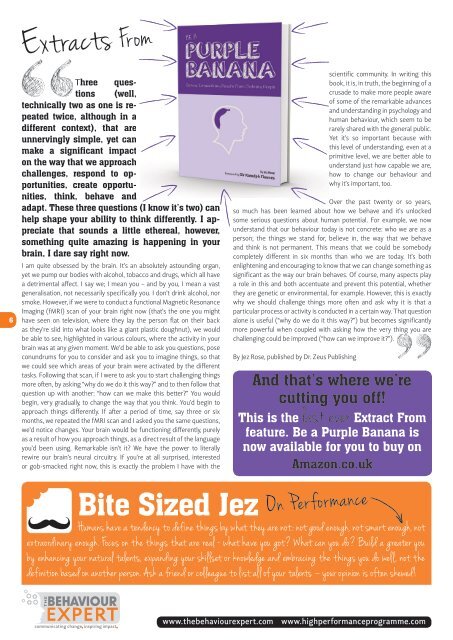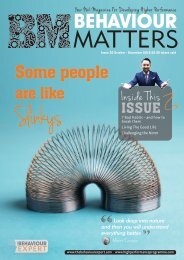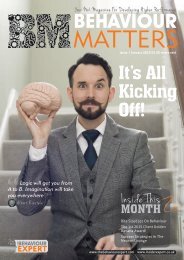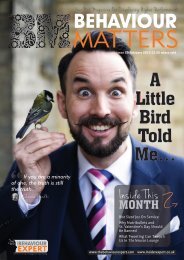Behaviour Matters June 2015
Create successful ePaper yourself
Turn your PDF publications into a flip-book with our unique Google optimized e-Paper software.
Extracts Fr om<br />
6<br />
Three questions<br />
(well,<br />
technically two as one is repeated<br />
twice, although in a<br />
different context), that are<br />
unnervingly simple, yet can<br />
make a significant impact<br />
on the way that we approach<br />
challenges, respond to opportunities,<br />
create opportunities,<br />
think, behave and<br />
adapt. These three questions (I know it’s two) can<br />
help shape your ability to think differently. I appreciate<br />
that sounds a little ethereal, however,<br />
something quite amazing is happening in your<br />
brain, I dare say right now.<br />
I am quite obsessed by the brain. It’s an absolutely astounding organ,<br />
yet we pump our bodies with alcohol, tobacco and drugs, which all have<br />
a detrimental affect. I say we; I mean you – and by you, I mean a vast<br />
generalisation, not necessarily specifically you. I don’t drink alcohol, nor<br />
smoke. However, if we were to conduct a functional Magnetic Resonance<br />
Imaging (fMRI) scan of your brain right now (that’s the one you might<br />
have seen on television, where they lay the person flat on their back<br />
as they’re slid into what looks like a giant plastic doughnut), we would<br />
be able to see, highlighted in various colours, where the activity in your<br />
brain was at any given moment. We’d be able to ask you questions, pose<br />
conundrums for you to consider and ask you to imagine things, so that<br />
we could see which areas of your brain were activated by the different<br />
tasks. Following that scan, if I were to ask you to start challenging things<br />
more often, by asking “why do we do it this way?” and to then follow that<br />
question up with another: “how can we make this better?” You would<br />
begin, very gradually, to change the way that you think. You’d begin to<br />
approach things differently. If after a period of time, say three or six<br />
months, we repeated the fMRI scan and I asked you the same questions,<br />
we’d notice changes. Your brain would be functioning differently, purely<br />
as a result of how you approach things, as a direct result of the language<br />
you’d been using. Remarkable isn’t it? We have the power to literally<br />
rewire our brain’s neural circuitry. If you’re at all surprised, interested<br />
or gob-smacked right now, this is exactly the problem I have with the<br />
Bite Sized Jez<br />
On Performance<br />
scientific community. In writing this<br />
book, it is, in truth, the beginning of a<br />
crusade to make more people aware<br />
of some of the remarkable advances<br />
and understanding in psychology and<br />
human behaviour, which seem to be<br />
rarely shared with the general public.<br />
Yet it’s so important because with<br />
this level of understanding, even at a<br />
primitive level, we are better able to<br />
understand just how capable we are,<br />
how to change our behaviour and<br />
why it’s important, too.<br />
Over the past twenty or so years,<br />
so much has been learned about how we behave and it’s unlocked<br />
some serious questions about human potential. For example, we now<br />
understand that our behaviour today is not concrete: who we are as a<br />
person; the things we stand for, believe in, the way that we behave<br />
and think is not permanent. This means that we could be somebody<br />
completely different in six months than who we are today. It’s both<br />
enlightening and encouraging to know that we can change something as<br />
significant as the way our brain behaves. Of course, many aspects play<br />
a role in this and both accentuate and prevent this potential, whether<br />
they are genetic or environmental, for example. However, this is exactly<br />
why we should challenge things more often and ask why it is that a<br />
particular process or activity is conducted in a certain way. That question<br />
alone is useful (“why do we do it this way?”) but becomes significantly<br />
more powerful when coupled with asking how the very thing you are<br />
challenging could be improved (“how can we improve it?”).<br />
By Jez Rose, published by Dr. Zeus Publishing<br />
And that’s where we’re<br />
cutting you off!<br />
This is the last ever Extract From<br />
feature. Be a Purple Banana is<br />
now available for you to buy on<br />
Amazon.co.uk<br />
Humans have a tendency to define things by what they are not: not good enough, not smart enough, not<br />
extraordinary enough. Focus on the things that are real - what have you got? What can you do? Build a greater you<br />
by enhancing your natural talents, expanding your skillset or knowledge and embracing the things you do well, not the<br />
definition based on another person. Ask a friend or colleague to list all of your talents – your opinion is often skewed!<br />
www.thebehaviourexpert.com<br />
www.highperformanceprogramme.com












